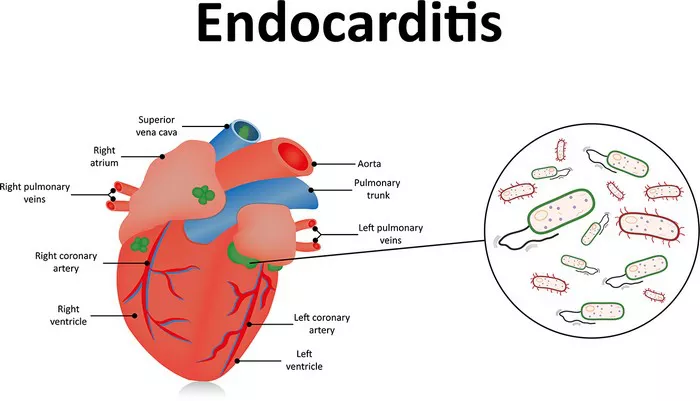Endocarditis is a serious medical condition characterized by the inflammation of the inner lining of the heart chambers and heart valves. It is typically caused by bacterial or fungal infections that enter the bloodstream and reach the heart. While endocarditis can be effectively treated with antibiotics and other medical interventions, the prognosis for untreated endocarditis can be severe. In this article, we will explore the potential outcomes and life expectancy of individuals with untreated endocarditis.
Understanding Endocarditis
Endocarditis can affect individuals of any age but is more commonly seen in older adults and those with underlying heart conditions. The condition often develops when bacteria or fungi from another part of the body, such as the mouth, skin, or gastrointestinal tract, enter the bloodstream and attach to damaged areas of the heart lining or heart valves.
The infection leads to the formation of clumps of bacteria and immune cells, known as vegetations, on the heart valves or inner lining. These vegetations can interfere with the normal function of the heart valves, leading to complications such as valve regurgitation, heart failure, and systemic infections.
Symptoms and Diagnosis
The symptoms of endocarditis can vary depending on the severity of the infection and the individual’s overall health. Common symptoms may include:
- Fever and chills
- Fatigue and weakness
- Shortness of breath
- Chest pain
- Palpitations (irregular heartbeats)
- Joint pain and swelling
- Petechiae (tiny red spots) on the skin
- Janeway lesions (flat, painless red spots on the palms and soles)
Diagnosing endocarditis typically involves a thorough medical history review, physical examination, blood tests to detect signs of infection (such as elevated white blood cell count and inflammatory markers), and imaging tests such as echocardiography to visualize heart valve abnormalities and vegetations.
Consequences of Untreated Endocarditis
Without prompt treatment, endocarditis can lead to serious complications and a significantly reduced life expectancy. Some of the potential consequences of untreated endocarditis include:
1. Heart Valve Damage: The persistent infection and inflammation can cause damage to the heart valves, leading to valve regurgitation (leaking of blood backward through the valve) or stenosis (narrowing of the valve opening). This can impair the heart’s ability to pump blood effectively and may require surgical repair or replacement of the affected valve.
2. Heart Failure: As the heart struggles to function properly due to valve damage and increased workload, heart failure can develop. This condition occurs when the heart is unable to pump enough blood to meet the body’s needs, resulting in symptoms such as shortness of breath, fluid retention (edema), and fatigue.
3. Systemic Infections: Untreated endocarditis can lead to the spread of infection to other parts of the body, including the lungs, brain, kidneys, and joints. This can result in conditions such as pneumonia, meningitis, septic arthritis, and kidney infections, which can further compromise overall health and life expectancy.
4. Embolism: Vegetations on the heart valves can break off and travel through the bloodstream, leading to embolism (blockage of blood vessels) in various organs such as the brain (causing stroke), lungs (causing pulmonary embolism), and limbs (causing peripheral artery embolism). These complications can be life-threatening and require urgent medical intervention.
Life Expectancy Without Treatment
The life expectancy of individuals with untreated endocarditis can vary widely depending on factors such as the underlying cause of the infection, the presence of other medical conditions, the severity of complications, and the timeliness of diagnosis and treatment initiation.
In general, untreated endocarditis is associated with a significantly higher risk of mortality compared to treated cases. Studies have shown that the mortality rate for untreated endocarditis can range from 20% to 80%, with higher rates seen in cases of aggressive infections, involvement of critical heart valves, and delayed diagnosis.
Without appropriate medical management, the progressive damage to the heart valves, the development of heart failure, and the risk of systemic infections and embolic events can contribute to a shortened life expectancy. Additionally, untreated endocarditis can lead to a decline in overall health and quality of life due to persistent symptoms and complications.
Importance of Timely Treatment
Given the serious nature of endocarditis and its potential consequences, early diagnosis and prompt treatment are crucial for improving outcomes and prolonging life expectancy. Treatment typically involves a combination of antibiotics to eradicate the infection, supportive care to manage symptoms and complications, and in some cases, surgical intervention to repair or replace damaged heart valves.
Patients with suspected endocarditis should seek immediate medical attention, especially if they experience symptoms such as fever, fatigue, chest pain, or palpitations. Early intervention can help prevent the progression of the infection, reduce the risk of complications, and improve long-term prognosis.
Conclusion
Untreated endocarditis is a life-threatening condition that can lead to serious complications and significantly reduce life expectancy. The consequences of untreated endocarditis include heart valve damage, heart failure, systemic infections, embolic events, and a higher risk of mortality.
Timely diagnosis and appropriate treatment are essential for improving outcomes and maximizing life expectancy in individuals with endocarditis. Patients should be vigilant about seeking medical care if they experience symptoms suggestive of endocarditis, and healthcare providers play a crucial role in promptly diagnosing the condition and initiating effective treatment strategies.
By raising awareness about the importance of early intervention and highlighting the potential consequences of untreated endocarditis, we can help improve patient outcomes and enhance overall cardiovascular health.


